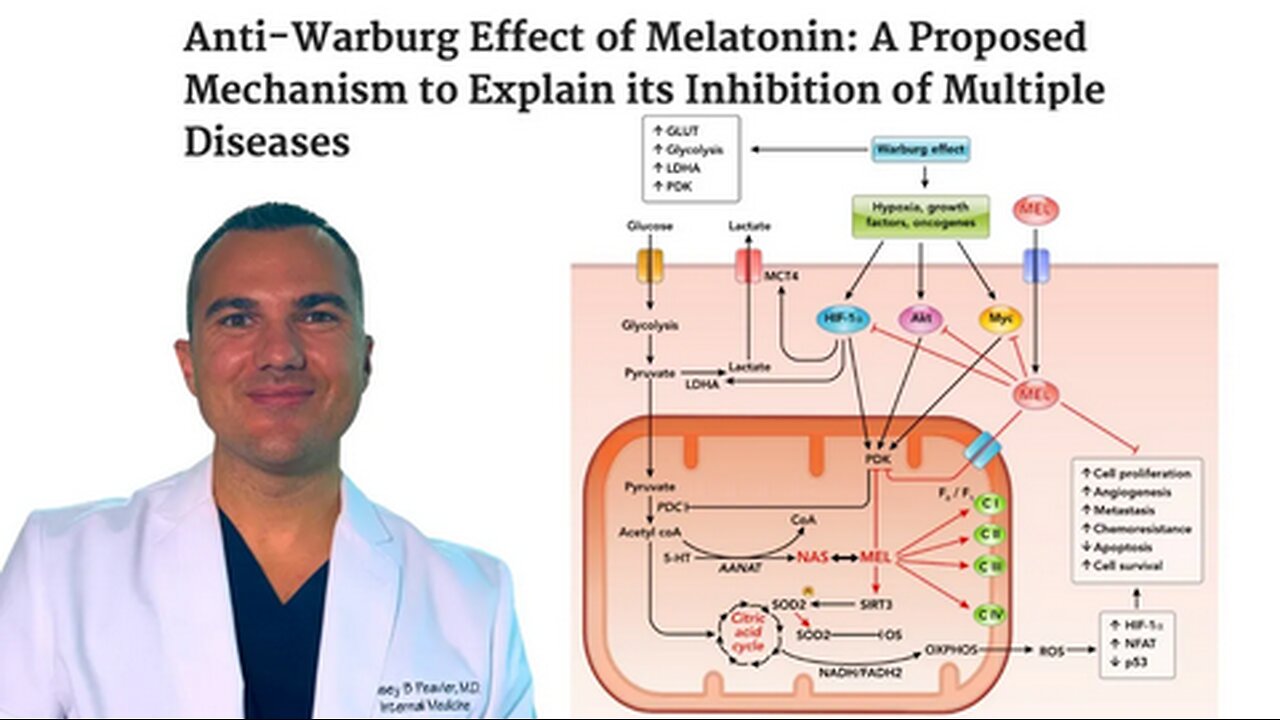Premium Only Content

Melatonin KILLS Cancer: REVERSES Warburg Effect & INHIBITS Glucose
https://pmc.ncbi.nlm.nih.gov/articles/PMC11104865/
Melatonin inhibits Warburg-dependent cancer by redirecting glucose oxidation to the mitochondria: a mechanistic hypothesis
Melatonin has the ability to intervene in the initiation, progression and metastasis of some experimental cancers. A large variety of potential mechanisms have been advanced to describe the metabolic and molecular events associated with melatonin’s interactions with cancer cells. There is one metabolic perturbation that is common to a large number of solid tumors and accounts for the ability of cancer cells to actively proliferate, avoid apoptosis, and readily metastasize, i.e., they use cytosolic aerobic glycolysis (the Warburg effect) to rapidly generate the necessary ATP required for the high metabolic demands of the cancer cells. There are several drugs, referred to as glycolytic agents, that cause cancer cells to abandon aerobic glycolysis and shift to the more conventional mitochondrial oxidative phosphorylation for ATP synthesis as in normal cells. In doing so, glycolytic agents also inhibit cancer growth. Herein, we hypothesize that melatonin also functions as an inhibitor of cytosolic glycolysis in cancer cells using mechanisms, i.e., downregulation of the enzyme (pyruvate dehydrogenase kinase) that interferes with the conversion of pyruvate to acetyl CoA in the mitochondria, as do other glycolytic drugs. In doing so, melatonin halts the proliferative activity of cancer cells, reduces their metastatic potential and causes them to more readily undergo apoptosis. This hypothesis is discussed in relation to the previously published reports. Whereas melatonin is synthesized in the mitochondria of normal cells, we hypothesize that this synthetic capability is not present in cancer cell mitochondria because of the depressed acetyl CoA; acetyl CoA is necessary for the rate limiting enzyme in melatonin synthesis, arylalkylamine-N-acetyltransferase. Finally, the ability of melatonin to switch glucose oxidation from the cytosol to the mitochondria also explains how tumors that become resistant to conventional chemotherapies are re-sensitized to the same treatment when melatonin is applied.
VIDEO source: https://www.youtube.com/watch?v=h4j5aZBXMgg
-

Sgt Wilky Plays
1 hour agoRumble Gaming Bad Company Presents WARZONEPALOOZA
50 -
![Devin Nunes - Devin Nunes Reveals The Document The [DS] Was Looking For Was Hidden,Truth Is Coming](https://1a-1791.com/video/fww1/20/s8/1/-/e/L/d/-eLdz.0kob-small-Devin-Nunes-Devin-Nunes-Rev.jpg) 1:17:44
1:17:44
X22 Report
7 hours agoDevin Nunes - Devin Nunes Reveals The Document The [DS] Was Looking For Was Hidden,Truth Is Coming
99K99 -
 LIVE
LIVE
GritsGG
8 hours agoRumble Customs! 3515 Ws! 🫡!
160 watching -
 3:56:15
3:56:15
BigTallRedneck
4 hours agoREDD CONQUERS WARZONEPALOOZA
145 -
![[LIVE] WARZONEPALOOZA | Team: Helljumpers | #RumbleGaming #RumbleTakeover](https://1a-1791.com/video/fww1/a8/s8/1/G/N/O/d/GNOdz.0kob-small-LIVE-WARZONEPALOOZA-Team-He.jpg) 3:03:22
3:03:22
Joke65
3 hours ago[LIVE] WARZONEPALOOZA | Team: Helljumpers | #RumbleGaming #RumbleTakeover
39 -
 3:42:37
3:42:37
Illyes Jr Gaming
6 hours agoIt's WARZONEPALOOZA!
1272 -
 LIVE
LIVE
The Sufari Hub
51 minutes ago🔴LABOR DAY LIVE - SUFARI TAKES ON HELLDIVERS 2 - FOR DEMOCRACY!
8 watching -
 LIVE
LIVE
CassaiyanGaming
4 hours agoWARZONE PALOOZA - Rebirth with Cassaiyan, HannibalLecter, and DudeBroDude
22 watching -
 4:13:38
4:13:38
Akademiks
6 hours agoWar in RAT-LANTA. Young Thug vs Gunna vs Ralo vs YSL MONDO. Who Will Le Bebe Pick. FINAL CRASHOUT!
137K4 -
 21:55
21:55
MYLUNCHBREAK CHANNEL PAGE
1 day agoFault Lines are GATES - Pt 3
20.8K6